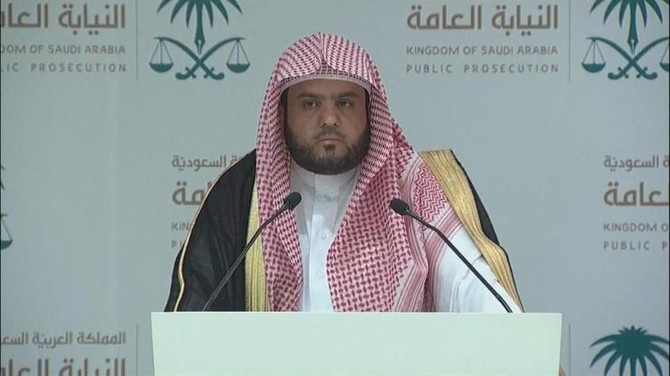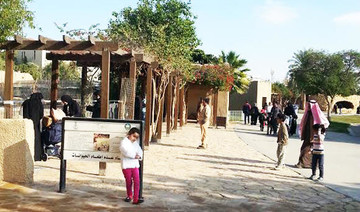RIYADH: Saudi Arabia’s public prosecutor is seeking the death penalty for five out of 11 suspects charged in the murder of journalist Jamal Khashoggi.
Khashoggi was killed in the country’s Istanbul consulate on Oct. 2 by a lethal injection after a struggle, and his body was dismembered and taken out of the building, Shalaan Al-Shalaan, deputy public prosecutor and spokesman, told reporters in Riyadh on Thursday.
Khashoggi’s body parts were then handed over to a local Turkish agent outside the consulate grounds, the spokesman said as he outlined the public prosecutor’s findings in the investigation.
He added that a sketch of the agent has been prepared and will be handed over to the Turkish authorities.
#Breaking: Official Statement by the #Saudi Public Prosecution on the Jamal #Khashoggi case. pic.twitter.com/TzSdRHIkIV
— Saudi Embassy (@SaudiEmbassyUSA) November 15, 2018
He said the head of Khashoggi’s negotiation team was the one who ordered the killing of the victim, adding that investigations into the whereabouts of the Saudi journalist’s body are ongoing.
He said the mission of the team was to persuade Khashoggi, who had been living in the US, to return to the Kingdom. The decision to kill him was taken on the day in Istanbul and after the head of negotiations visited the consulate and realized it was impossible to bring Khashoggi out alive if he refused to cooperate.
In response to question a question at the press conference , Al-Shalaan said the Saudi Crown Prince did not have any involvement or knowledge of the order to kill Khashoggi.
The prosecutor said a former advisor had met the team that was ordered to repatriate Khashoggi.
------
READ MORE:
Full text: Saudi Arabia public prosecution briefing on the Jamal Khashoggi murder investigation
Saudi Arabia FM: Khashoggi murder investigations will continue until all questions are answered
France denies receiving Khashoggi tapes from Turkey and accuses Erdogan of playing games
Saudi envoy: Khashoggi murder ‘a tragedy,’ but justice will be done
------
The advisor, believed to be the former Royal Court advisor Saud Qahtani, has been banned from traveling and remains under investigation, Al-Shalaan said. The case has been transferred to court while investigations continue.
Saudi Arabia has requested Turkey sign a cooperation deal on a probe into the murder.
“We have requested the brotherly Turkish authorities to sign a special cooperation mechanism specific to this case in order to provide them with the results of the investigation,” Al-Shalaan said, adding that “the public prosecutor is still awaiting a response to these requests.”
He said the incident started on Sept. 29 “upon the issuance of an order to bring back the victim to the Kingdom by means of persuasion, if not, by force.”
The order was issued by the former deputy president of the General Intelligence Presidency Ahmad Assiri to the mission commander.

Jamal Khashoggi was killed in Turkey’s Istanbul consulate on Oct. 2. (Reuters)
The mission commander formed a 15-member team that included three groups — negotiations, intelligence and logistics — to persuade Khashoggi to return to the Kingdom.
Assiri asked Qahtani to advise the negotiations group in the team because of his previous relationship with Khashoggi.
Qahtani believed Khashoggi had fallen under the influence of foreign groups and countries hostile to Saudi Arabia and that his presence outside the Kingdom was a threat to national security. He encouraged the team to persuade Khashoggi to return, Al-Shalaan said.
The prosecution said the mission commander contacted a forensics expert to join the team to clear any evidence from the scene “in the case force had to be used to return the victim.”
Al-Shalaan said the forensics expert joined the team without the knowledge of his superiors.
“The investigation has concluded that the crime was carried out after a physical altercation with the victim took place,” Al-Shalaan said. “He was forcibly restrained and injected with a large amount of a certain drug resulting in an overdose that led to his death.”
“The investigation has identified those that ordered and carried out the murder, totaling five individuals that have confessed to the murder.”
The five have not been named as per standard Saudi legal procedures.
The investigation has also identified five people who removed Khashoggi’s body from the consulate building and two people who disposed of his clothes and belongings, including his watch and glasses.
The prosecution found surveillance cameras inside the consulate had been disabled, and they had identified the individual responsible.
After the killing, the mission commander wrote a false report to Assiri that Khashoggi had left the consulate building after they had failed to persuade him to return to Saudi Arabia.




































